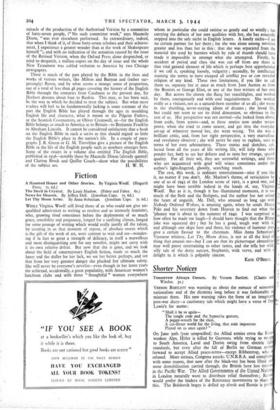Fiction
A Haunted House and Other Stories. By Virginia Woolf. (Hogarth Press. 7s. 6d.) The Devil In Crystal. By Louis Marlow. (Faber and Faber. 6s.) News for Heaven. By Jeffrey Dell. (Jonathan Cape. 7s. 6d.) Let Thy Moon Arise. By Anna Sebastian. (Jonathan Cape. 75. 6d.) WHILE Virginia Woolf still lived those of us who could not give un- qualified admiration to writing so restless and so intensely feminine, who, growing tired -sometimes before the deployment of so much grace, sensibility and poignancy, longed for a unifying climax, longed for some passage of writing which would really justify all the talent, by creating in us that moment of repose, of absolute assent which is the gift of the work of art, were content to wait and see—wonder- ing if in fact so great a strength of delicacy, in itself a marvellous and most distinguishing arm for any novelist, might not carry with it its own relative defeat. But now that she is gone, and we look about the field of contemporary English fiction, made so much the barer and the duller for her lack, we see her better perhaps, and see that from her very greatest danger she plucked her ultimate safety. She will never be everyone's novelist—even though in her latter years she achieved, accidentally, a great popularity, with American women's luncheon clubs and with those " thoughtful " women everywhere whom in particular she could satirise so gently and so wittily ; but carrying the defects of her rare qualities with her, she has assuredly stepped into the safe niche in English letters. A lonely niche—I see no certain partner for her there ; for she was alone among novelists greater and less than her in this : that she was separated from the material she used by barriers which by rule of thumb should have made it impossible to attempt what she attempted. Firstly, by accident of period and class she was cut off from any share in that vital general element of life which is perhaps best apprehended if we call it, speaking loosely, vulgarity ; secondly, by intellectual training she seems to have escaped all conflict pro or con revealed religion of any kind. These two limitations, if you like to call them so, separate her at once as much from Jane Austen as from the Brontës or George Eliot, or any of the best writers of her own day. But across the chasm she flung her searchlights, and worked by them, courageously and with cool inquisitiveness. She worked really as a visitant, not as a natural-born member of us all ; she wrote in the shuttling, never-staying idiom of dreams ; she loved life, but could not seem to see its third dimension, so obvious to the rest of us. Her perspective was not normal—she looked from above, from aside, from across—and, as these stories now under review prove, when she tried to come nearer, and get into the everyday set-up of whatever moved her, she went wrong. Yet she was a brilliant critic, and, from her right perspective, a very marvellous and revelatory observer ; she will never be easy to explain, save in terms of her own arbitrariness. These stories and sketches, col- lected from all the years of her writing life, will help those who ponder her, both to see her defects and to taste her strange, special quality. For all- their wit, they are sorrowful writings, and those who are acquainted with grief will wince sometimes under the author's light-fingered, ghostly, searching touch. The rest, this week, is ordinary entertainment—nice if you like it, no matter if you don't. Mr. Marlow's theme, of revisitation by one of us of 1943 of the London scene of 1922, is a good one, and might have been terrible indeed in the hands of, say, Virginia Woolf. But as it is, though it has illuminated moments, it is too much of the flesh and the fleshpots, and the author has not seized the heart of anguish. Mr. Dell, who amused us long ago with Nobody Ordered Wolves, is amusing again, when he sends Marco Polo and his secretary down from Heaven to find out what the 'phoney war is about in the summer of 194o. I was surprised at how often he made me laugh—I should have thought that the Blimp joke was squeezed dry ; but he has a good, tough way with it, and although one skips here and there, his violence of humour does give a certain flavour to the chestnuts. Miss Anna Sebastian's Viennese whimsy, Let Thy Moon Arise, is not at all the kind of thing that amuses me—but I can see that its picturesque absurdities may well prove entertaining to other tastes, and she tells her wild, silly tale of the dotty outcast, Stephanie, with verve, and with a delight in it which is palpably sincere.
KATE O'BRIEN


























 Previous page
Previous page